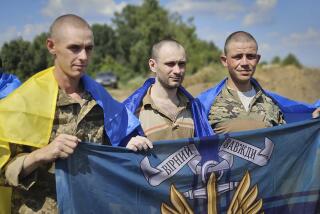Moscow Buys Ukrainian Bombers, Nuclear Missiles : Military: Purchases from Soviet stockpile reflect Russia’s unease over its own army, NATO expansion.
MOSCOW — Trying to stretch the life of its nuclear arsenal, Russia has struck deals with Ukraine to buy 48 intercontinental ballistic missiles from an inherited Soviet stockpile that was slated for destruction, a top military official disclosed Friday.
Col. Gen. Igor Sergeyev, commander of Russia’s strategic rocket forces, announced that Ukraine agreed to sell 32 Stiletto SS-19 missiles during negotiations Friday. Sixteen such missiles were sold earlier and moved to silos in Russia, he said.
In a separate deal Friday, Russian air force Cmdr. Pyotr Deinekin said Russia will buy 19 Tu-160 Blackjack and 25 Tu-95 Bear aircraft--Ukraine’s entire fleet of bombers able to carry nuclear weapons--and about half of its 600 cruise missiles.
Russia’s purchases reflect its wariness of Western plans to expand the North Atlantic Treaty Organization and the growing priority Russia’s leadership assigns to nuclear forces as a deterrent to compensate for weakness and disarray in the army.
As obliged by the 1991 Strategic Arms Reduction Treaty, or START I, with the United States, Russia is trimming part of the huge Soviet nuclear arsenal, but most are older weapons systems than those it will buy from Ukraine. Under a 1994 agreement, Ukraine has been sending its nuclear warheads to Russia to be dismantled.
U.S. officials said the sales announced Friday do not appear to violate either pact.
The sales mark a policy change for Ukraine, which has destroyed 80 of the 176 nuclear missiles it inherited from the Soviet Union.
Ukraine’s first post-Soviet government feared Russia as a military threat, and Kiev was tempted to keep the weapons until it concluded an accord for their destruction.
But Ukraine’s current leaders, elected last year, are more pragmatic and view the weapons as barter for badly needed Russian oil and gas.
“This agreement represents a change from Ukraine’s strategic goal in disarmament, which had been to reduce the total number of nuclear weapons in the world and not to move them from one place to another,” said Konstantin Morozov, defense minister in Ukraine’s previous government.
Russian news agencies reporting on the negotiations in the Russian Black Sea resort of Sochi had no comment from Ukrainian officials on the weapons deals except to confirm them.
Terms of the sales were not disclosed, but they were presumed to include a reduction of Ukraine’s energy debt to Russia.
Sergeyev told Russia’s Interfax news agency that the purchases “will allow Russia’s nuclear potential to be maintained at the necessary level until 2009” without the need to manufacture and deploy costly new missiles.
With 19 new Tu-160s, Russia will have 25 such bombers in its air force, according to the London-based International Institute for Strategic Studies. The thin-nosed bombers can carry 12 air-to-surface nuclear missiles and fly 8,000 miles without refueling.
According to the same institute, Russia has 150 silo-based SS-19 missiles, with six warheads each, but they are deteriorating.
The SS-19 missiles sold by Ukraine are slightly newer, and Russian military leaders wanted them as replacements in the hope that they could, with proper maintenance, last 10 to 15 more years.
*
Until now, Ukraine has been destroying its missiles as it disarms them and sends the warheads to Russia. Its bombers have also been disarmed.
A 1993 arms reduction treaty, START II, would deepen the arms cuts made under START I and outlaw the deployment of SS-19s.
Until recently, Russian military planners had decided to let their multiple-warhead missiles deteriorate and not replace them, according to Pavel Felgenhauer, defense correspondent of the Russian newspaper Sevodnya.
“But with U.S.-Russian relations cooling and the fading prospects of ratification of START II, they are now considering other possibilities,” including research to prolong the missiles’ life span, Felgenhauer wrote Thursday.
“The strategic rocket forces chiefs say they are preparing contingency plans to meet any possible international crisis,” he added.
Times special correspondent Mary Mycio in Kiev, Ukraine, contributed to this report.
More to Read
Sign up for Essential California
The most important California stories and recommendations in your inbox every morning.
You may occasionally receive promotional content from the Los Angeles Times.










